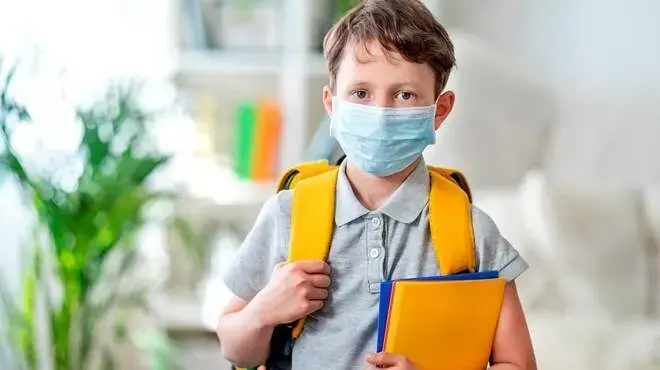- Home
- Medical news & Guidelines
- Anesthesiology
- Cardiology and CTVS
- Critical Care
- Dentistry
- Dermatology
- Diabetes and Endocrinology
- ENT
- Gastroenterology
- Medicine
- Nephrology
- Neurology
- Obstretics-Gynaecology
- Oncology
- Ophthalmology
- Orthopaedics
- Pediatrics-Neonatology
- Psychiatry
- Pulmonology
- Radiology
- Surgery
- Urology
- Laboratory Medicine
- Diet
- Nursing
- Paramedical
- Physiotherapy
- Health news
- Fact Check
- Bone Health Fact Check
- Brain Health Fact Check
- Cancer Related Fact Check
- Child Care Fact Check
- Dental and oral health fact check
- Diabetes and metabolic health fact check
- Diet and Nutrition Fact Check
- Eye and ENT Care Fact Check
- Fitness fact check
- Gut health fact check
- Heart health fact check
- Kidney health fact check
- Medical education fact check
- Men's health fact check
- Respiratory fact check
- Skin and hair care fact check
- Vaccine and Immunization fact check
- Women's health fact check
- AYUSH
- State News
- Andaman and Nicobar Islands
- Andhra Pradesh
- Arunachal Pradesh
- Assam
- Bihar
- Chandigarh
- Chattisgarh
- Dadra and Nagar Haveli
- Daman and Diu
- Delhi
- Goa
- Gujarat
- Haryana
- Himachal Pradesh
- Jammu & Kashmir
- Jharkhand
- Karnataka
- Kerala
- Ladakh
- Lakshadweep
- Madhya Pradesh
- Maharashtra
- Manipur
- Meghalaya
- Mizoram
- Nagaland
- Odisha
- Puducherry
- Punjab
- Rajasthan
- Sikkim
- Tamil Nadu
- Telangana
- Tripura
- Uttar Pradesh
- Uttrakhand
- West Bengal
- Medical Education
- Industry
Online mode of learning during Covid negatively impacts children's behavior: JAMA

Massachusetts: In a new study conducted by Emily C. Hanno and team it was found that when students were forced to alter learning styles during the epidemic, their conduct was worse. In the cohort study, parents reported that during remote learning versus during in-person learning their children's behaviors at home were worse. The findings of this study were published in the journal JAMA Pediatrics on 10th January 2022.
The COVID-19 epidemic has disrupted the education of over one billion children globally, with many alternating between remote, hybrid, and in-person learning. As the COVID-19 epidemic and disruptions to learning continue, it is critical to understand the implications for children's behavioral health in order to improve response actions.
From January 4 to May 23, 2021, 405 parents of children participating in the larger Early Learning Study at Harvard, a population-based cohort study of children in Massachusetts approved by the institutional review boards of Abt Associates and Harvard University, was given online surveys four times. Parents then reported their child's behavioral health on three different scales: (1) their perception of their child's general behavioral health in the previous month (on a 5-point scale ranging from much better than usual to much worse than usual); (2) the number of maladaptive behavioral changes in the previous month; and (3) the frequency of dysregulated behaviors using 11 items from the Behavior Rating Inventory of Executive Function3 rated on a 4-point scale ranging from never to all the time. To assess mean within-child variations in outcomes related to learning formats, regression models with child fixed effects were employed. Several time-varying factors were also included in the analyses, which are expected to account for variations in both learning formats and child outcomes over time.
The key findings of this work were as follow:
1. Across the four waves, the majority of children (203 [57.0%]) altered learning methods at least once.
2. Children's behavioral results tended to be poorer during distant schooling than during in-person schooling, according to child fixed-effects studies.
3. Parents indicated that their kid demonstrated worse overall behavior, more maladaptive behavioral changes, and more dysregulated behaviors when learning remotely vs in person.
4. Children that participated in hybrid learning fell somewhere in the middle, exhibiting better general conduct than when they were remote but poorer behavior than when they were in-person.
In conclusion, the findings show that parents viewed their children's behavior to have altered systematically as a result of the COVID-19 pandemic's educational disruptions. Because of the ongoing and ever-changing public health situation, clinicians and others who work directly with children and families should consider not only the likely academic consequences of the COVID-19 pandemic, but also the implications for children's social, emotional, and behavioral well-being.
Reference:
Hanno EC, Fritz LS, Jones SM, Lesaux NK. School Learning Format and Children's Behavioral Health During the COVID-19 Pandemic. JAMA Pediatr. Published online January 10, 2022. doi:10.1001/jamapediatrics.2021.5698
Medical Dialogues consists of a team of passionate medical/scientific writers, led by doctors and healthcare researchers. Our team efforts to bring you updated and timely news about the important happenings of the medical and healthcare sector. Our editorial team can be reached at editorial@medicaldialogues.in.
Dr Kamal Kant Kohli-MBBS, DTCD- a chest specialist with more than 30 years of practice and a flair for writing clinical articles, Dr Kamal Kant Kohli joined Medical Dialogues as a Chief Editor of Medical News. Besides writing articles, as an editor, he proofreads and verifies all the medical content published on Medical Dialogues including those coming from journals, studies,medical conferences,guidelines etc. Email: drkohli@medicaldialogues.in. Contact no. 011-43720751


